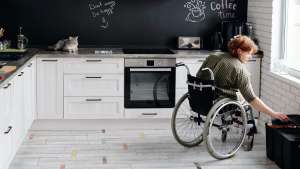A hospital stay is typical for aging individuals. However, that doesn’t mean they are pleasant or easy to deal with. For the elderly, it can be frightening to think that they are at a place where they feel alone and neglected.
At the same time, visiting a hospital usually means starting a new treatment regimen, changing up medications, or having surgery- things that can leave elderly patients feeling uncertain about their future. Not to mention, it can be scary and intimidating to think about your aging loved ones requiring a hospital stay.
That said, an elderly patient’s family usually handles all the logistical side of things. These include submitting the necessary paperwork, communicating with their caregiver, coordinating their care plan, and ensuring their stay at the hospital is as comfortable as possible.
Let’s look at a few ways of making your elder’s stay at a hospital more pleasant.
1. Advocate for your elderly patient
Despite giving it their best, hospital staff, be it nurses or doctors, are often short on numbers and overworked to the maximum. As a result, the team will probably be stretched to the limit, which might result in your elderly loved one not receiving the care they require. Therefore, advocating for them is extremely vital in such a case.
During your visit to the hospital, always visit the nurse’s station and ask questions about your loved one’s care. Furthermore, see the hospital management and ensure that they aren’t neglecting anything regarding your elderly’s care and needs. Moreover, Ask whether the managerial staff are well educated and well equipped in case there’s an emergency.
Recognized hospitals should be your go-to; why? Because they require their employees to hold a bachelor’s or a masters degree in healthcare management online, ensuring they’re experienced and able to handle complex management issues. An educated, professional management will help decide whether or not they’re well-equipped to do their job with due diligence.
2. Bring your elder’s essentials
For elderly patients settling into a hospital environment, contentment and comfort start with the small things. As you get them ready and prepare them for their time away from home, you’ll need to pack a few daily essentials that will help them follow their at-home daily routines.
Depending on your elder’s circumstances and preferences, some of these essentials might include;
- Comb and hairbrush
- Toothpaste and toothbrush
- Soap, shampoo, and other necessary bathing essentials
- Eyeglasses
- Lotions, lip balms, and skin creams
- Hearing aids
- Earplugs
While the hospital or healthcare facility may provide some of these essentials, your elder will feel more confident and comfortable with their stay if they take along some familiar items with them. In the end, don’t forget to ask hospital management about any restrictions on what your elder can bring along with them.
3. Respect your elder’s needs
Don’t forget that a hospital can be exhausting for your elder. They might feel tired or weak as they recover from surgery or disorientation due to such an extended stay in a hospital environment. So, you must remain flexible, accommodating, and as patient as possible and respect your elder’s needs.
For instance, prepare to remain silent when your elder doesn’t want to speak. Furthermore, be understanding if they feel frustrated, tired, or nervous, and don’t argue with them at all. In addition, keep your visits short as your elder might sometimes feel cranky and won’t enjoy your stay.
Lastly, help out wherever possible. If your elder asks for something, do it without ever questioning them, for instance, adjusting the blinds, changing the channel on the TV, or adjusting the room temperature.
4. Add a personal touch to their room
In addition to board games and other fun activities to do, think about the things you can offer your elderly to brighten up their day, bring a smile to their face, and create a sense of home. An easy way to do so is by bringing in small bedding and décor items, such as;
- A light, comfortable blanket like a flannel throw or fleece
- Flowers in a vase
- A comfortable pillow from home, especially one that the elder uses at home
- A framed photo or their pet or family members
- Stuffed animals
- Some of the elder’s favorite snacks and drinks
However, please consult with your elder’s caregiver or hospital management before bringing any drastic changes to their room. Respect limits set by the hospital, doctors, or the nursing staff.
5. Respect your elder’s need for sleep, even if it’s midday
When elderly patients cannot sleep due to staff waking them up, anxiety from the hospital stay, or pain from surgery, they may have trouble getting the rest they require to feel better. So if you arrive at the hospital to see them and they are sleeping, it’s better to let them be as the more they rest, the sooner they’ll recover.
So instead, it is better to leave a note that says you stopped by but didn’t want to disturb their sleep.
6. Provide your elders with fun things to do
A hospital stay for your elder can alternate between incredibly stressful to dull and slow. When the momentum shift in either direction, your elder might benefit from having something fun to do to stay occupied and avoid coming down with stress.
So, help your elders keep their hands busy and mind sharp by providing them with some accessible activities like;
- Board games such as checkers or chess
- Books and magazines to read
- A pencil and notepad for writing down questions or thoughts
- A phone or tablet preloaded with movies, podcasts, games, or music.
- Adult coloring books or a canvas with paint
- Sudoku and crossword puzzles
Conclusion
In the end, ask yourself that what would make you feel better if you were in your elder’s position. Do these things for them. On the other hand, never push your elder for anything. Give them some space when they require it. Imagine what it feels like to be worried, in pain, and temporarily helpless.
With such a thing in mind, follow the ways mentioned above to ensure your elder remains as comfortable as possible during their hospital stay.











